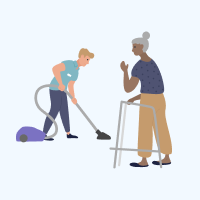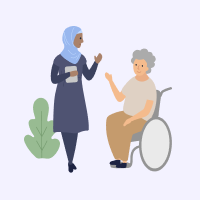Caring for someone approaching the end of their life can be an emotional experience. It can also be rich and rewarding.
Because of the emotional strain that can come with providing this type of care, you may experience some negative feelings. These can include isolation, stress, resentment and fatigue. It's important to know you are not alone and these feelings are normal.
Looking after yourself is as critical as looking after the person you care for. That’s why it’s important to ask for help. Here you’ll find a range of information to support you in your caring role.
Tips from other carers
Working with health professionals
Planning ahead
What support is available?
Tips from other carers
As a carer, there may be times when you feel overwhelmed. It can be helpful to speak with other carers who are going through – or have been through – your situation. The tips below come from other carers.
Tips for supporting the person you care for:
- Make the room as comfortable as possible, with their favourite things nearby.
- Use touch as a form of comfort and to express feelings.
- Play their favourite music, podcast, or audiobooks.
- Read to them – whether it’s a favourite book or poem or an interesting piece of news.
- Understand and support their end-of-life wishes.
Tips to help you cope with your emotions:
- Focus on what you can do, not what you can’t.
- Remember that sometimes being there is all you need to do.
- Recognise when you need help, and ask for it.
- Let relatives, friends, neighbours, and volunteers help you when they offer.
- Share your anxiety or concerns with someone you trust.
- Allow yourself some short breaks.
- Plan ahead to make it easier to cope through difficult times.
- Do some form of exercise, even if it’s as simple as deep breathing.
- Write your feelings down.
- Allow yourself to cry; it can be very therapeutic.
Working with health professionals
When the person you care for approaches the end of life, they may find it difficult (or be unable) to communicate their needs and wishes. When this happens you will be an important link between the person you care for and their health professionals.
Be sure to keep doctors and other health workers informed of:
- their allergies and reactions to food or medications
- how they might think or feel in certain situations
- their wishes for end-of-life care
- if they would prefer care at home
- their wishes about comfort, pain relief, and treatment
- their cultural and spiritual preferences
- the nature and types of support needed.
Planning ahead
As a carer, it’s important to discuss future health care needs and wishes with the person you care for. This is called advance care planning.
Knowing this information will be helpful when the person you care for can no longer communicate their wishes or make decisions. The person you care for may also like to formalise their plan through an advance care directive (also known as a living will).
The Department of Health, Disability and Ageing and Carer Gateway websites have resources to help you navigate this time. You can find information on:
- starting the end-of-life conversation with the person you are caring for
- advance care planning
- advance care directives
- steps involved in planning for the end of life
- a guide to end-of-life caring
What support is available?
Carer counselling
Carers can access short-term counselling and emotional support through the Carer Gateway. Counselling can help you learn strategies to deal with stress and the emotional impact of your caring role.
For more information, call 1800 422 737 to find out more.
Peer support groups
Peer support groups can offer you a safe place to talk about your feelings with other carers. You can meet other carers with similar experiences and learn from their coping strategies. You can also share advice and suggestions to support each other.
To find out more about peer support groups in your local area, contact Carer Gateway on 1800 422 737. The Carer Gateway community forum is a good option if you’d like to meet and speak with other carers online.
Respite care
Respite care allows you to have a break while someone else looks after the person you care for. There are different types of government-subsidised respite services which you may be able to access. This includes planned respite and emergency respite.
Read more about respite services.
Palliative care
At times, you may feel like you need help in your caring role. When this happens, palliative care can offer you practical support for things like:
- pain management and medications
- advice on how to give care, including medications
- help to get the equipment you need
- assistance to talk about sensitive issues
- counselling and grief support.
For information on palliative care services in your local area, ask your GP or visit the National Palliative Care Service Directory. You can also learn more about palliative care on the Department of Health, Disability and Ageing website.
Dealing with grief
When someone you care for approaches the end of life, grief is a natural emotion. Grief is also a very personal experience; there is no right or wrong way to feel.
It’s important to remember that you aren’t alone and support is available. Find someone to talk with – whether that’s a family member, friend, professional counsellor, or support group.
For more information on loss and grieving, see:


